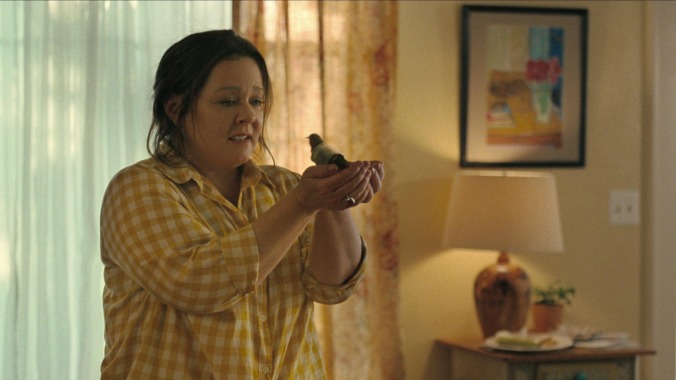You’ll want to fly far, far away from the Melissa McCarthy dramedy The Starling
The new movie from the director of Hidden Figures dive-bombs spectacularly


Since its inception in 2005, the Black List, a semi-official industry ranking of the best (or, at least, the best-liked) unproduced screenplays in Hollywood, has launched critical favorites and Oscar winners like Juno, Whiplash, and Manchester By The Sea. It’s also given us The Beaver, Passengers, and All About Steve. That both winners and losers have been pulled from the Black List suggests that executives are no better at telling them apart than your average schmuck. Or maybe it’s just that what reads like a bold swing on the page can just as easily land with a splat on the screen. That was almost surely the case with The Starling, whose script appeared on the Black List way back in ’05. Sixteen years is one of the longer arcs from inception to development and release in the list’s history, but those going in expecting some gem finally given the opportunity to shine will instead be confronted by a movie that plays like a transmission from another galaxy—that, or one of those parody movies on 30 Rock. (This would be a project for Jenna, not Tracy.)
Attempting to rationalize the behavior of the characters in this film is a quick road to madness, so please bear with the following synopsis. When we first meet Lilly Maynard (Melissa McCarthy), she’s a grocery store clerk attempting, without much success, to make peace with the death of her infant daughter one year earlier. Her husband, Jack (Chris O’Dowd), is struggling even more than she is, to the extent that he’s currently living in a residential psychiatric facility after attempting suicide. On the advice of a doctor at the facility who keeps decade-old business cards on hand for… reasons, Lilly goes to see a therapist named Larry (Kevin Kline) who’s since quit the business and become a veterinarian. He sees her anyway, which comes in handy when Lilly enters into a codependent dynamic with a bird that keeps dive-bombing her as she tries to bring the scraggly, abandoned vegetable garden in her front yard back to life. In case you failed high school English, that last part is a metaphor.
The emotional beats in this film that aren’t blatantly manipulative don’t make a lick of sense, as director Theodore Melfi (Hidden Figures) clumsily grafts misjudged comedy onto a devastating drama about loss. Again, this may have read differently on the page. Humor is, after all, one of the ways that humans cope with the things that would otherwise break us. But blending all these contradictory emotions proves beyond Melfi’s abilities. The Starling chugs along as a sappy, sentimental tearjerker until a line in the script calls for a rejected joke from Dolittle, and violà, suddenly a dog is humping McCarthy’s leg. All of this is soundtracked by the terminally white sounds of Brandi Carlisle, Nate Ruess, and The Lumineers, who provided original compositions for the film. It sounds like the intro music to an HGTV show about quirky farmhouses, and has the same emotional impact.
The saddest thing about all of this is that McCarthy and O’Dowd make a convincing onscreen couple, and both of them are strong enough actors to find the real, defeated people in this phony script. It’s a good cast all around, actually: Kline does his best, bringing what he can to a character whose primary trait is infinite patience for Lilly barging into his office (and, eventually, home) at all hours. Timothy Olyphant and Skyler Gisondo serve time in generic, thankless roles as Lilly’s coworkers, and Daveed Diggs is there as a psychiatric nurse. Poor Loretta Devine gets the worst of it as the broadest, most stereotypical character in the movie, one of Jack’s fellow “residents” who’s prone to crude outbursts at inopportune moments.
The Starling helmer Melfi broke out directing McCarthy in a similarly cloying, smile-through-the-tears type of film, 2014’s St. Vincent. At that time, the actor was working exclusively in broad comedies, and needed a role that proved that she was good at more than just pratfalls. Now it’s McCarthy who’s doing Melfi the favor—without her in the lead role, his movie would be completely unbearable. McCarthy is loyal to her collaborators, which is an admirable trait in a person but sometimes lands her in stinkers like this one. Now they’re even, and she can move on.